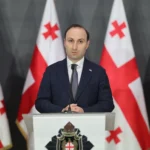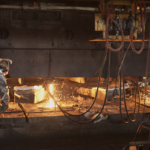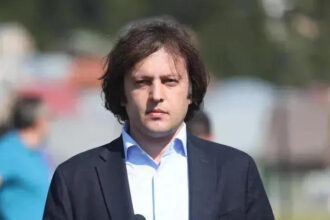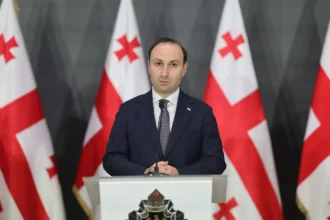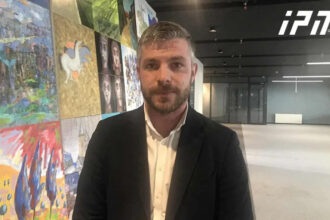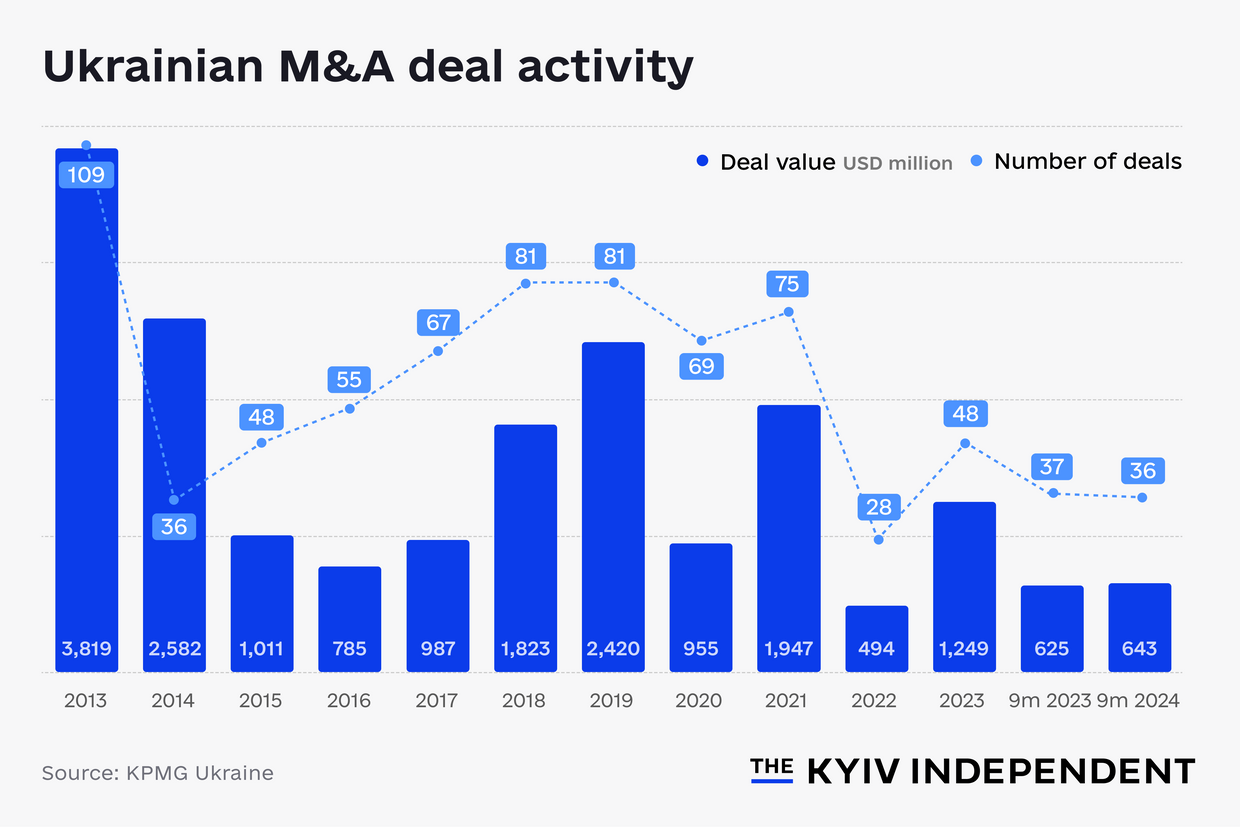Ukraine is far from being an investor’s dream, but this year more and more valuable business deals have been signed in the war-torn nation.
According to a recent report by KPMG Ukraine (an accounting organization based out of Kyiv), there were 36 Ukrainian mergers & acquisitions in the first nine month of 2024. The estimated total value was $643 million. The average M&A value was $38 millions.
Comparatively, 37 deals totaling $625 million were made in the same period of last year. The average deal value was $27 million.
In the first year of the full-scale invasion, Ukraine’s M&As were at a low point. Only 28 deals totaling $494 million were completed in 2022. This was the lowest level for a decade. Ukraine’s business activity has slowly recovered from the ashes. It is boosted by inflation control, GDP growth in 2023 and resilient companies.
Foreign investors look for opportunities
Despite Ukraine’s battles on the battlefield and Russian attacks that destroyed a chunk of Ukraine’s energy infrastructure, foreign investments have increased this year. In the first nine-month period of 2024, there were 10 inbound deals totaling $473 million. This compares to 13 deals that brought in $278 millions in 2023.
Three transactions totaling 255 million dollars and five transactions totaling $159 million dollars respectively, accounted for the majority of inbound deals.
Dmytro Boroday, a partner with private equity firm Horizon Capital told the Kyiv Independent that those who are coming in are willing and able to take high risks in exchange for high rewards, but they are only investing in companies which are operating successfully. They are avoiding distressed assets.
Since the beginning of the full-scale invasion, M&A has not been active in sectors like metal and mining. Many of these assets are near frontline areas and have been targeted by Russia.
In this year, the Saudi Agricultural and Livestock Investment Company acquired a 12.6% share in Ukrainian agritech company MHP SE for $54million. MHP SE is a leading exporter and manufacturer of vegetable oils.
SALIC, like most foreign investors, was already in Ukraine. Even though more foreign companies show interest in Ukraine, new investors are still rare.
One exception was the purchase of Ukraine’s third-largest mobile operator Lifecell and service provider Datagroup-Volia by French billionaire Xavier Niel’s company NJJ Capital, who merged the two companies under a new entity Datagroup-Volia-Lifecell. The deal was worth over $600m.
The European Bank for Reconstruction and Development and International Finance Corporation announced on October 10 that they would provide $435m to finance the merged firm.
Boroday said that the deal, including all capital expenses, will total $1.5 billion.
“We’d like to see more deals on this scale and magnitude. This would hopefully signal to other investors that now is the time to invest in major deals and not wait until the war ends.
Six deals totaling $290 millions attracted the largest amount of funding from foreign investors. The average deal value was $48million, with IT unicorn Creatio securing $200 million in funding in the first nine month of the year.
KPMG stated that “this confirms market confidence in the stability of Ukraine’s IT sector, which has demonstrated resilience with minimal interruptions even during wartime. This sector’s ability to remote work and maintain operations even with decentralized workers” is a testament to its potential.
Expanding abroad
KPMG believes that Ukrainian companies will continue to invest money abroad in the future. Since the Covid-19 pandemic began, outbound activity has reached a record high with 10 deals totaling over $55 million. Ukrainians are seeking to diversify their economy and pursue international opportunities.
Outbound M&As are not limited to the EU. In August, Ukrainian IT firm Intellias acquired UK-based IT consultant NorthLink Digital and in April, C2 Solutions of the United States acquired digital health company C2 Solutions.
The largest outbound deal, valued at $32.4million, was conducted by Ukraine’s private energy company DTEK. It is owned by Rinat Akhmetov.
After signing an agreement with Columbus, the company, which has been severely affected by Russia’s attacks against energy infrastructure, announced in March that it had acquired a battery storage project of 133 megawatts. DTEK has made a breakthrough into the Polish renewables sector as it looks to a greener future in line with EU.
Domestic Investments
Domestic deals accounted for 44% of M&As, but only 18% of their total volume. KPMG believes that this could be due to the lack transparency of domestic transactions. Only 25% of the deal values are disclosed. A more accurate picture is expected by the end of the calendar year.
The largest sale disclosed was the privatization by Maxim Krippa, e-sports tycoon of Stalker and owner of Ola Fine LLC, of Kyiv’s Hotel Ukraina.
Since the end of the war, Ukraine has intensified its efforts to privatize in order to raise money for state budget. Krippa’s acquisition was the largest privatization during the first nine month of the year.
Cemin Ukraine, a state-owned company and one of the largest titanium producers in the world, sold UMCC-Titanium to Cemin Ukraine in October for $96 millions.
Private Ukrainian companies have also paid considerable attention to agriculture. The largest deal saw MHP SE purchase a 100% stake of Ukrainian Meat Farm LLC from $15.1 million.
KPMG stated that more deals are expected to be announced following the land-market reforms in Ukraine at the beginning of the year, which “continues unlocking private investment potential in Ukrainian agricultural,”
Dominic is the Kyiv Independent’s business reporter. He has written for several publications, including the Financial Times and Radio Free Europe/Liberty. Dominic was previously a disinformation specialist with StopFake, debunking Russian false news in Europe. Read more
Read More @ kyivindependent.com

